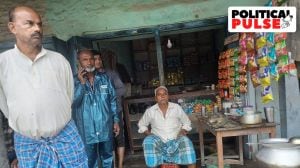Politics remains ‘out-of-bounds’ for Naga women
Two decades ago, when the influential Naga Mothers’ Association built up a massive campaign for total prohibition in the state...

Two decades ago, when the influential Naga Mothers’ Association built up a massive campaign for total prohibition in the state, the authorities were compelled to declare Nagaland a dry state. But 20 years on, Naga women are yet to make an impact on politics in the state.
“None of the two main political parties have bothered to nominate women candidates. This despite the fact that Naga women have excelled in almost all spheres of life,” rues Anungla Aier, director of Nagaland University’s Centre for Women Studies.
Several Naga women have made it to the civil services and armed forces. At least two have received Padma Shri in the past three years. But when it comes to politics, not even one has been able to make it to the Assembly. The only woman to make it to the Lok Sabha was Rano Shaiza during the post-Emergency Janata wave.
“It is not that our women do not have the qualities to become decision-makers. But it is the male-biased society which has kept them out of politics,” adds Aier. She, however, attributes historical reasons to this. “Our social structure has a clear division of gender roles. While the menfolk were historically engaged in protecting our villages and clans, women were confined to the family and kitchen. I think it will take some more time for the society to change its mindset,” she said.
While only two women contested the Assembly polls in 2003, this time the figure has gone up to four. They are Rhakilla of the NCP in Tuensang-II, Zeneiselie of the JD(U) in Dimapur-I, Rosemary Jamir (Independent) in Alongtaki and Tsoly of the BJP in Kiphire. “It is not that we have any bias against women. But we could not find a woman who would be a winnable candidate,” claims Hokheto Sumi, president of the Nagaland Pradesh Congress Committee.
“Sano Vamuzo did come up seeking a ticket, but it was too late because we had already finalised our list,” says Shurhozelie Lezietsui, chief of the Nagaland People’s Front (NPF). Sano Vamuzo, widow of former Chief Minister Vamuzo Phesao, is also chairperson of the State Commission for Women.
However, Eralu Swu, a scholar at the Women Studies Centre, blames it on women. “Naga women in general lack awareness about their rights. Most of them do not even know where to seek redressal or lodge complaints if they are wronged. How can you expect them to find space in the male-dominated political arena?” asked Swu.
The women on the street too are unhappy. “Why shouldn’t women also become MLAs and ministers? I think the male leaders do not want to vacate space for them,” says Kesonei Nuo, a mother of three, who runs a grocery shop. Equally sore is Vilito Tsuqu, who works for an NGO called Youth Action for Rural Development. “When Indira Gandhi or Sonia Gandhi can lead political parties, when so many states can have women as chief ministers, why can’t women here be given a chance?” she asks.
But T Monalisa Chankija, the poet and writer who edits Nagaland Page, sums it up best: “All our political parties are basically boys’ clubs with very restricted entries. Members of these boys’ clubs are not too fond of women with intelligence, independent thinking, integrity, principles and values. Moreover, women don’t like to be associated with money and muscle-power politics.”



- 01
- 02
- 03
- 04
- 05




























